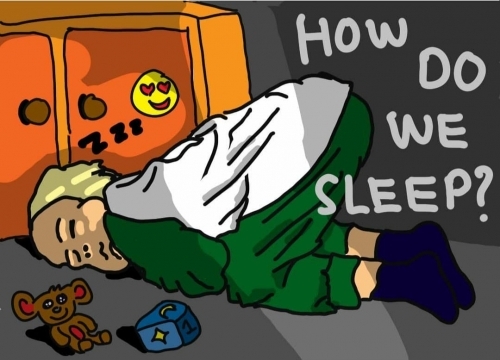profile/275FB_IMG_159577683448782990.jpg
Yisa

HOW DO WE SLEEP
~1.1 mins read
1ï¸âƒ£Sleep is regulated by two biological mechanism, which is circadian rythm and homeostatis, that work together to regulate our sleep and wake cycle. To undestand how do we sleep we need to understand this two mechanism.
2ï¸âƒ£Circadian rythms
Direct a wide variety of functions from daily fluctuations in wakefulness to body temperature, metabolism, and the release of hormones. They control your timing of sleep and cause you to be sleepy at night and your tendency to wake in the morning without an alarm. Your body’s biological clock, which is based on a roughly 24-hour day, controls most circadian rhythms. Circadian rhythms synchronize with environmental cues (light, temperature) about the actual time of day, but they continue even in the absence of cues.
3ï¸âƒ£Sleep-wake homeostasis
Keeps track of your need for sleep. The homeostatic sleep drive reminds the body to sleep after a certain time and regulates sleep intensity. This sleep drive gets stronger every hour you are awake and causes you to sleep longer and more deeply after a period of sleep deprivation.
4ï¸âƒ£Another factors that influence sleep and wake cycle are medical conditions, medication, stress, sleep environtment, food, and exposure to light. Exposure to light is the greatest influence, because speciallized cells in retinas process light and give information to brain whether it is day or night so it can delay or advance our sleep cycle.
5ï¸âƒ£Sleep has a typical underlying architecture characterized by arhythmic alternation between NREM and REM stages. NREM are divided by 4 stages, which is 75% of our sleep and REM consist of 25% of our sleep.
profile/275FB_IMG_159577683448782990.jpg
Yisa

Women Who Buy Sex: Why They Do It, And What Their Experiences Are Like
~3.7 mins read
Most research on people who patronize sex workers has focused on men. In some ways, this isn’t surprising because men are much more likely to report having paid for sex than are women. For example, in a recent YouGov survey of 1,000 adult Americans, 12% of men reported having paid for sex before compared to just 1% of women. Similarly, in a nationally representative survey of more than 20,000 Australians aged 16-69, researchers found that 17% of men said they had paid for sex, while only 0.3% of women said the same [1].
However, these figures may significantly underreport the actual number of women who have ever engaged the services of a sex worker.
In the YouGov survey referenced above, it is important to note that another 1% of women said “I don’t know†when asked if they had ever paid for sex. Additionally, in a separate study of female sex tourists in the Caribbean, none used “prostitution†to describe the sexual encounters they had with local men in exchange for money; instead, many characterized their interactions as “romance†[2].
Findings like this make it difficult to estimate precisely how many women have paid for sex because it is clear that not everyone is willing to admit to this behavior and, further, some may not look at their own behavior through the lens of prostitution. The latter may partly stem from the fact that many women view prostitution as inherently exploitative when men are buying from women, yet they don’t consider it exploitative when women are the buyers because they perceive a more equal power exchange in such cases [2].
Any way you look at it, however, there are certainly many women who buy sex. So what are their experiences like? And what motivates them to buy sex in the first place? A new study published in the journal Sexualities offers some insight [3].
This study was based on qualitative interviews of 21 adult women in Australia who had paid for sex before. The women ranged in age from 18-69, half identified as heterosexual, and one identified as transgender. Here is a summary of the key findings from the research:
· Most women reported buying sex through either an escort or agency and, on average, they reported being satisfied with their experiences; however, one-third reported situations that did not meet expectations (e.g., they felt rejected by the sex worker, the worker was unprofessional, or the worker oversold their sexual skills). Despite less than satisfactory experiences by some, all of the women expressed openness to paying for sex again in the future.
· Half of the women said that their primary motivation for buying sex was therapeutic, such as dealing with a sexual difficulty (like vaginismus, in which the vagina reflexively contracts, thereby making intercourse difficult and/or painful) and healing from trauma (such as having a history of intimate partner violence or having experienced childhood sexual abuse). Also, the transgender participant reported that it was important for her to be with a partner who treats her like a woman and believed that sex workers would be less judgmental in this regard.
· Many of the women reported achieving their therapeutic goals and, according to the researchers, “several interviewees suggested sexual services should be rebatable from Medicare.â€
· Many women said they paid for sex because they wanted to learn more about sex, such as getting a better understanding of how their own body functions, exploring their sexual orientation (some of the women purchased services from same-sex providers), and experimenting with new sex acts (such as BDSM).
· Most women said that part of the reason they bought sex was related to a desire for intimacy. In other words, it wasn’t just about sex, but also about emotional connection.
· Pleasure was another big motive, such as wanting to receive (rather than give) pleasure and to be “totally indulged.â€
· Some of the women reported that they felt physically safer buying sex than having casual sex, and many said that they felt buying sex was emotionally safer than having casual sex. That said, some women reported initially feeling nervous and afraid about buying sex, with a few going as far as to institute safety plans, such as having a security backup for the first encounter.
· About one-third of participants said that buying sex made them feel more powerful and increased their self-confidence. Further, some said that these benefits extended over into non-paid sex, such as making it easier to negotiate and navigate casual encounters with other partners.
· Most of the women said that they did not tell many other people that they had bought sex, in part, due to feelings of stigma attached to this activity. However, about half said that they would “unconditionally recommend†buying sex to a close friend.
It is, of course, important to note that this study was based on a small sample of women and, therefore, cannot be considered representative of all women who have paid for sex. More research is certainly needed; however, these findings are important because, in the words of the authors, they “directly challenge concepts of female sexual passivity and objectification generally, and specifically in commercial sex settings.â€
Pls like and follow me
Advertisement

Link socials
Matches
Loading...
